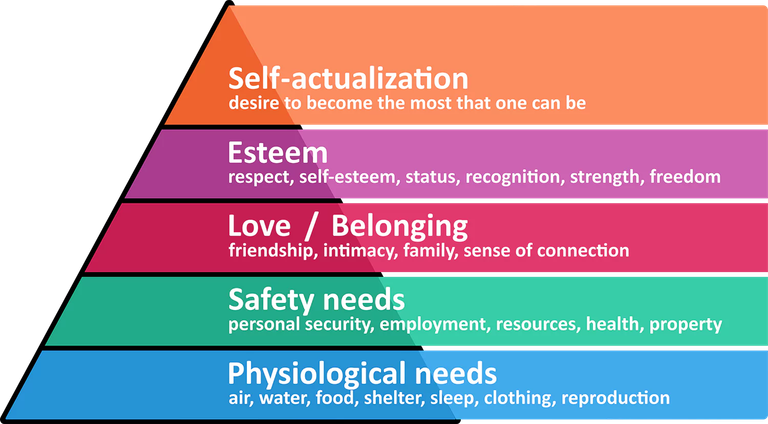The other day I referenced Maslow's Hierarchy of of Needs, with which I assume the majority of people reading are familiar. And while it is limited and paints in broad brush strokes, I do think it is a pretty good guide for the basic human to consider different stages and aspects of their lives, and perhaps redirect behaviour to improve outcomes.

Your Behaviour and Mine
I often talk about "behaviour", but it is something I rarely define, because there are so many possible parts to it, as well as a lot of nuance. Essentially though, it is just the way we actually act. That might be obvious, but as said, there are nuances, and the way we act and the way we think or believe we act, can be quite different things. And then of course, there are the automatic and innate behaviours too, that we may have very little awareness of, as our focus is elsewhere.
Your Outcomes and Mine
"Outcome" is another term I use often, but don't define for similar reasons, because each of us might have different outcomes we want. Not only that, even if we want the same thing, the behaviours required to achieve it can be very different from one person to the next. I can tell you what I have done, and what I have observed, but I can't tell you definitively if the same will work for you. However, with enough data, it is possible to be predictive of what behaviours lead to which outcomes, because there will be probabilities involved.
Your Intuitions and Mine
We often like to think that we know ourselves better than anyone else knows us, and we know what is best for us. Yet, this is potentially quite a poor belief, especially if we are trying for a specific outcome. The reason is that while we might know what we want, me are unlikely to be experienced in designing and following all of the behaviours required to get there. Not only this, we will also be biased toward what we want to do, over what we need to do. Our intuitions often work against us, because a lot of what we need to do is counter intuitive.
Your False Feedback and Mine
And then, there are all the other problems associated with being human, which means that even though there should be a definitive "perfect" way to travel from point A to point B, the way is riddled with challenges, including our own emotional states. We have a nervous system that is biased toward wanting to feel good, because that is the way we can survive and thrive. However, it evolved through a far simpler set of conditions than we face today, and without all of the other influences that have been developed and designed to hijack the feel good mechanisms and trick us into habitual behaviours.
Maslow's Hierarchy
Your Wellbeing and Mine
I also talk about "wellbeing" a lot and again, this is something that is hard to define at the group level, or the personal level. These days though, we tend to fragment and compartmentalise parts of our lives as if they each live in a vacuum, and don't have interdependencies. This creates a major problem for general wellbeing, because even if we get one piece working well, it can have detrimental effects on other pieces. When we shift our focus to those parts and start acting on them, we will disrupt other parts negatively. In the current generalised culture, we look to maximise our good feelings in a narrow view view, without compromise to align and balance other perspectives and layers.
Your Resources and Mine
And this all got me thinking about my own resources and how I apply them to each layer. Yes, this is far more complex to consider than a simple distribution, precisely because of all the interdependencies, interactions and the false feedback loops, but I still believe it is worth exploring.
Your Time and Mine
For instance, if we were looking at our "time" resources, how much of it are we spending on each layer, and what are the returns on our investments? Let's assume that about one third of it is spent either sleeping or eating, that leaves us with 16 hours in the day to put into the other layers. Employment, personal relationships, Esteem?
Where are you placing your time?
Your Money and Mine
Time might be money, but having all the time in the world, doesn't mean you have all the money. For most of us, money is a limited resource and what it buys is opportunity. But, opportunity for what? Well, the same as all the other resources we can spend, to affect layers of our needs. However, this is where I think a lot of our intuitions are hijacked and influenced to spend both our time and money on wants, rather than needs. And, most of our "free" expenditure goes into the fourth layer, Esteem. We spend our time and money buying a good feeling, or avoiding a bad feeling, and because our feelings change, we assume that we are doing the right thing at the right time. Hijacked.
Looking at your monetary expenditures, where are they going and what are the returns on your investment?
Your Attention and Mine
Attention is the most valuable resource we have, but again, it is pretty easy to hack us into spending it in places that don't provide a very good return for our wellbeing. And again, I think quite a lot of attention isn't spent on the major areas that we know are important and we need, but rather an these minor dalliances that give very little in return. Essentially, like death by a thousand cuts, our attention is being bled out of us so that we have nothing left to fill our vital organs, our heart, our lungs, or our muscles. We are reducing the attention on our physiological, safety and love layers, to maximise the esteem layer, and then wondering why we feel so bad, *even though we keep trying to increase our good feelings.
Looking at your time and money expenditures as lagging indicators of attention spend, where are you focusing?
Your Meaning and Mine
Maybe, looking at it this way is meaningless to you, even if it is useful for me. As said, we all have our differences and I may not have the answers you need, or want. But I reckon we should all take a step back at times and consider what we need, want and whether our behaviours are taking us there, making adjustments where we can. However, I also think that we don't know ourselves as well as we believe we do, and due to our emotional investment in ourselves and the poor feedback we get from our feelings, we might not be the best suited to working out what we need to do, without support. That support might be a person, or it just might be a learning experience that fills the necessary gaps, but believing we know it all, is likely going to work against reaching our goals.
And, what I have found personally is that while unexpected events can change our lives in an instant, intentional change tends to take more time and resources than expected. If we want to improve our wellbeing, whether it be within a broad or narrow context, we are going to have to behave intentionally. If we aren't doing the right things now, we are going to have to discover what the right things to do are, and how we can coax ourselves to do them, rather than just hoping they will happen.
Don't we all want to improve our experience?
So, what do You and I need to do?
Taraz
[ Gen1: Hive ]

I've actually been learning a lot of these things the older I get. I have a note in my Google Keep that I have been hanging onto for a future post that talks about how important it is for me to be "right" the older I get. It's not just about taking the path of least resistance either, it's just that some responses and behaviors you know are going to lead to other responses and behaviors (by the other person) and honestly, it just isn't worth it. It's a slow process for me though. Which isn't necessarily a bad thing because probably by the time I finally do reach self actualization, I will die the next day.
I wonder, if wanting to be right isn't just a want, but also a need. As we get older, we have gathered more experience and, we have less time to apply it to make an impact. We don't have the luxury of time to make as many mistakes. Not saying this justifies, but maybe it is part of our DNA too.
Could be. Maybe we just don't feel like we have the time to deal with the drama to prove our point.
I agree, unexpected events change our lives instantly and this is usually permanent. Changes that come from us take a long time because we do not want to go out of our comfort zone. We are lazy about this and change takes a long time.
It is easier to keep wasting our resources on something we know doesn't work, than spend them on something that has no guarantee that it will.
If one can reach the third level in this world today, it is a big success, I think.
I reckon we go to the fourth, and pretend we don't need the third.
Hive satisfies (or should satisfy) most of my needs. Payouts are getting bigger and I am getting more comments lately. I have not cashed out a single hive yet but at the moment future looks promising.
Don't put all your life eggs in one Hive basket :)
Yes, it's very difficult to define behaviour, but you might be interested in reading my article on Behaviours and Attitudes
Defining what a behaviour is isn't the difficulty, it is defining which behaviours are the right ones for the circumstances, and the person involved.
It is usually hard to do the right thing that requires change. And that is if you even know what the right thing is to do now...